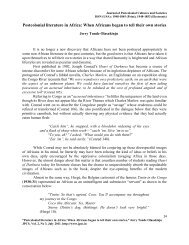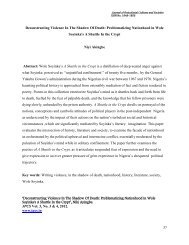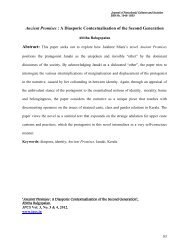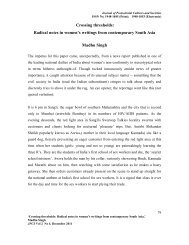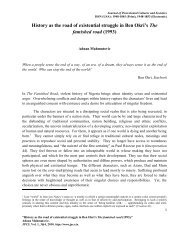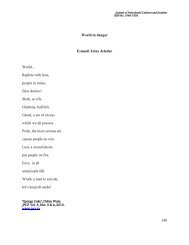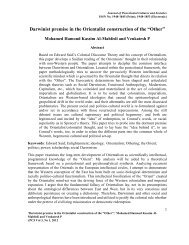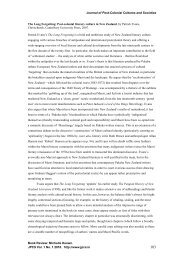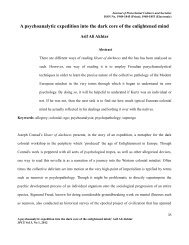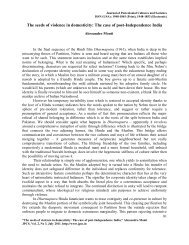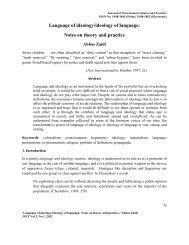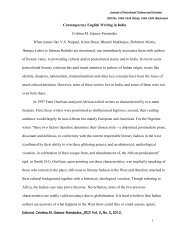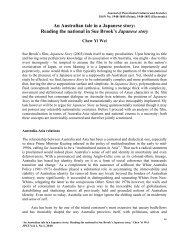'Complicity and resistance: Women in Arundhati Roy's The - JPCS
'Complicity and resistance: Women in Arundhati Roy's The - JPCS
'Complicity and resistance: Women in Arundhati Roy's The - JPCS
You also want an ePaper? Increase the reach of your titles
YUMPU automatically turns print PDFs into web optimized ePapers that Google loves.
Journal of Postcolonial Cultures <strong>and</strong> Societies<br />
ISSN No. 1948-1845 (Pr<strong>in</strong>t); 1948-1853 (Electronic)<br />
community <strong>in</strong> Kerala. Ammu is enamoured of the untouchable labourer Velutha <strong>and</strong><br />
violates the “Love Laws” which her community has <strong>in</strong>herited from, among other th<strong>in</strong>gs,<br />
their H<strong>in</strong>du past. Her transgression of the caste, class <strong>and</strong> religious boundaries mounts a<br />
rebellion of a k<strong>in</strong>d aga<strong>in</strong>st her marg<strong>in</strong>alization as a woman. Aijaz Ahmad calls her “a<br />
woman of great grit” (Prasad, 2006, p. 39) <strong>and</strong> Murari Prasad comments thus about her<br />
attempt at self-realization which is not unconnected with the fate of other subalterns:<br />
“Ammu‟s rebellion aga<strong>in</strong>st maternal <strong>and</strong> marital conventionality, <strong>and</strong> f<strong>in</strong>ally, her liaison<br />
with dark-sk<strong>in</strong>ned <strong>and</strong> untouchable Velutha (ironically mean<strong>in</strong>g white) constitutes a<br />
violation aga<strong>in</strong>st a determ<strong>in</strong>ate social order, sponsor<strong>in</strong>g the immutable „love laws‟. Her<br />
rebellion or her “quest for self-identity”, as Tirthankar Ch<strong>and</strong>a po<strong>in</strong>ts out is “an attempt<br />
at repossess<strong>in</strong>g, renam<strong>in</strong>g, reknow<strong>in</strong>g the world”, but it “appears doomed from the very<br />
beg<strong>in</strong>n<strong>in</strong>g because of the nature of the society where she has had to seek refuge with her<br />
tw<strong>in</strong>s after her divorce <strong>and</strong> also because of the <strong>in</strong>capacity of her k<strong>in</strong> (mother, great-aunt<br />
Kochamma) to provide an adequate model for redef<strong>in</strong><strong>in</strong>g the Self” (Ch<strong>and</strong>a 1997:40)”<br />
(2006, p.16) Ammu is a victim of a marriage that does not work out. Her be<strong>in</strong>g treated as<br />
an outcast <strong>in</strong> her own family clearly def<strong>in</strong>es her position <strong>in</strong> the society.<br />
But she rebels aga<strong>in</strong>st such social structures <strong>and</strong> challenges marriage that rather seems to<br />
be a discipl<strong>in</strong>ary <strong>in</strong>stitution, as Michel Foucault would have called it, work<strong>in</strong>g towards<br />
silenc<strong>in</strong>g <strong>and</strong> controll<strong>in</strong>g the one who st<strong>and</strong>s apart, as if a lunatic/non-conformist who<br />
needs to be imprisoned/reasoned. Foucault discussed how asylums were be<strong>in</strong>g put up, <strong>in</strong><br />
the pretext to serve medical knowledge, to isolate <strong>and</strong> <strong>in</strong>carcerate dissidents <strong>in</strong> 17 th<br />
century Europe—a time that saw the rise of the cont<strong>in</strong>ents imperial ambitions. “<strong>The</strong>y did<br />
not <strong>in</strong>troduce science, but a personality, whose powers borrowed from science only their<br />
disguise, or at most their justification. <strong>The</strong>se powers, by their nature, were of a moral <strong>and</strong><br />
social order; they took root <strong>in</strong> the madman‟s m<strong>in</strong>ority status, <strong>in</strong> the <strong>in</strong>sanity of his person,<br />
not of his m<strong>in</strong>d” (Rab<strong>in</strong>ow, 1991, p.160). Ammu, a personality, has to be locked up too.<br />
She, afterwards, dies exiled. But before her acceptance of such fate, <strong>in</strong> desperate attempts<br />
‘Complicity <strong>and</strong> <strong>resistance</strong>: <strong>Women</strong> <strong>in</strong> <strong>Arundhati</strong> Roy’s <strong>The</strong> God of Small Th<strong>in</strong>gs,’ Golam Gaus Al-<br />
Quaderi <strong>and</strong> Muhammad Saiful Islam<br />
<strong>JPCS</strong> Vol 2 No 4, December 2011<br />
63



